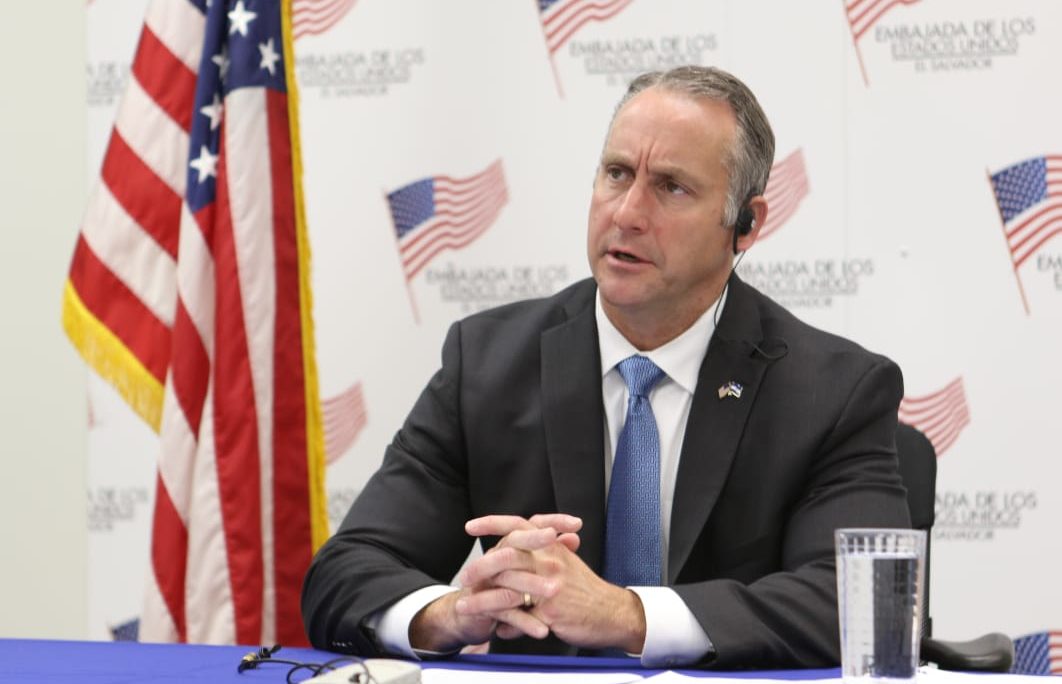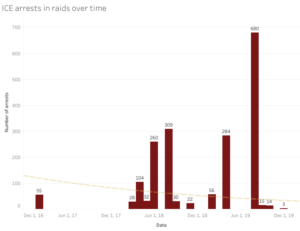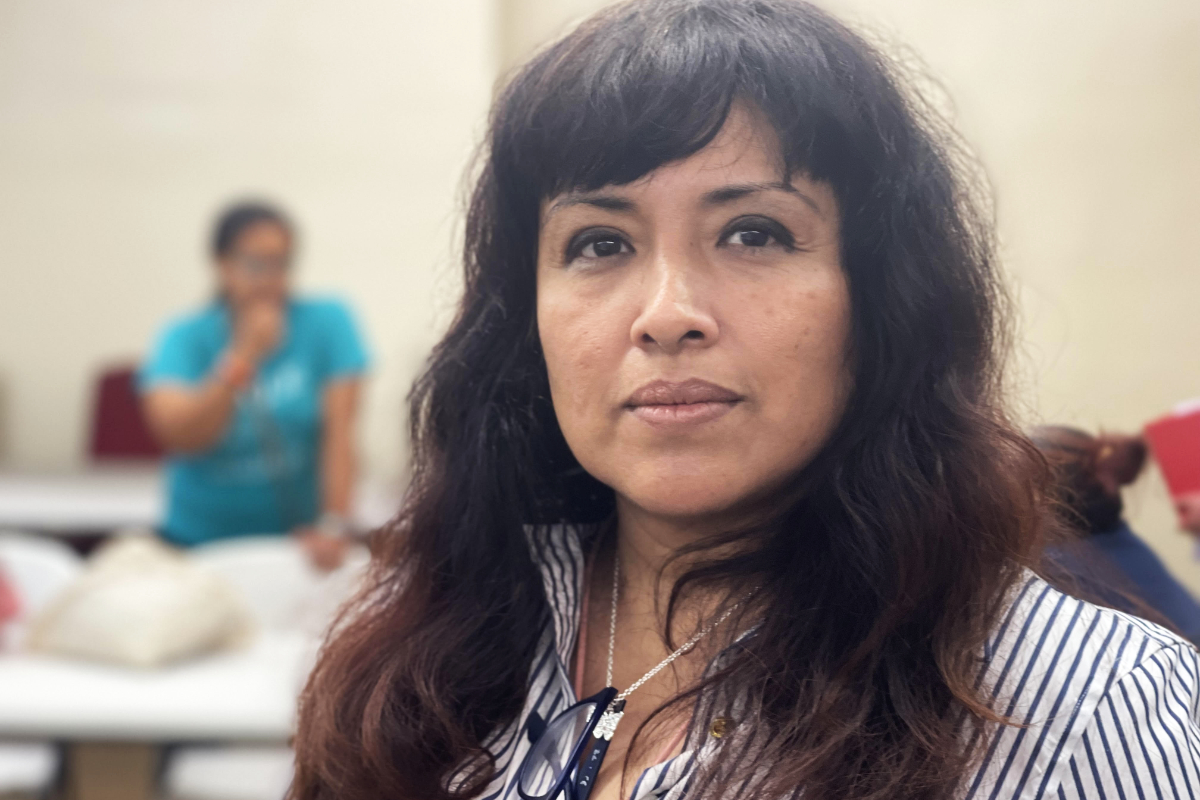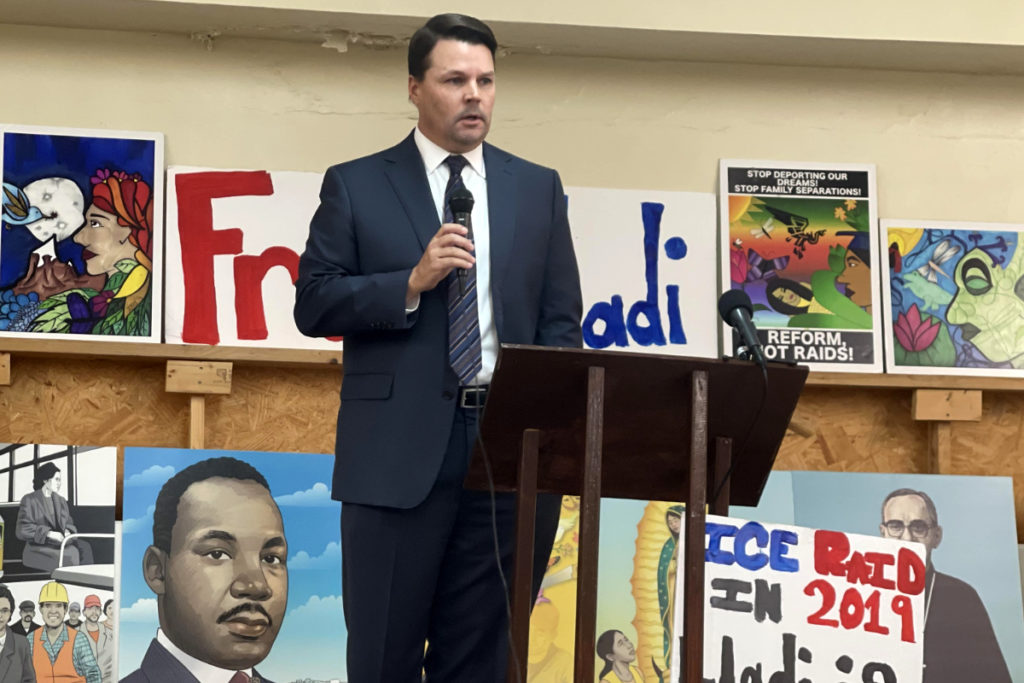University of Mississippi School of Law MacArthur Justice Center Director Cliff Johnson‘s world was upended when he received a deluge of calls asking for legal aid for about 700 people caught in the U.S. Immigration and Customs Enforcement raid of seven chicken plants in Mississippi in 2019. Though he has about 30 years of experience as a litigant, he had never handled a single immigration case before then.
“When the raids happened in August of 2019, I was minding my own business up in the law school at the University of Mississippi, and the phone started ringing off the hook,” Johnson told the Mississippi Free Press on May 9, 2022, at the Masonic Temple in Jackson, Miss.

Then-acting ICE Director Matt Albence, in a press conference on the day of the 2019 raid, said the action was about enforcing the law. “These are not new laws, nor is the enforcement of them new,” he said. “The arrests today were the result of a year-long criminal investigation.”
Johnson said the mass arrests caught many people in the state off-guard, and they scrambled to react. “You have a state that has a very small immigrant population by percentage, very few immigration lawyers, very few advocates, particularly at the time of the raids,” he said. The American Immigration Council reports that about 2% of the people in Mississippi are immigrants. Only Montana and West Virginia have lower percentages.
“We just weren’t prepared—we got caught flat-footed, and it was an unbelievable undertaking; hundreds of people came in from out-of-state, (and) advocates here were working full time,” Johnson added. “The first immigration hearing I ever saw I was a lawyer in. I literally was reading immigration law for dummies trying to figure it out.”
Hundreds Deported to Dangerous Places
Just before his interview with the Mississippi Free Press, Johnson joined other immigrant-rights advocates—Southern Poverty Law Center, American Civil Liberties Union, National Association for the Advancement of Colored People, and Immigrants Alliance for Justice and Equity—at a press conference.
“Hundreds of people have been deported back to places that are dangerous, where they are at risk, and where they are vulnerable,” Johnson said during the conference. “Hundreds of people remain in the crosshairs of the American ‘immigration judicial system,’ where there’s very little due process, where children are left to defend themselves at ages 6 and 10 and 12, where there is no right to counsel, where those judges are appointed by the executive branch, not the judicial branch.”
Speaking later to the Mississippi Free Press, he expressed how the events altered his understanding of immigration issues in the United States.
“I’m here because, in August of 2019, the phone started ringing, and I got exposed really for the first time in my career to the American immigration system and how it impacts people who are just trying to make it in this world—in a complicated, dangerous world—just trying to find a way to support their families,” he said.
At the press conference, advocates called on ICE to release a 28-year-old Guatemalan woman named Lladi Ambrocio-Garcia, who worked as a chicken cutter at Koch Foods in Morton, Miss., when ICE raided that chicken factory and six others in the state on Aug. 7, 2019, arresting hundreds of workers.

Ambrocio-Garcia later attempted to come back into the country without legal clearance, but was arrested again and spent about eight months in ICE detention before her release on May 20, 2022. Advocates and thousands of people signed letters to Department of Homeland Security Secretary Alejandro Mayorkas demanding her freedom pending the determination of her immigration case, including a letter from U.S. Rep. Bennie Thompson, House Committee on Homeland Security Committee chairman, to ICE.
“So many of us across Mississippi got pulled into this work,” attorney Johnson added as he continued relating the aftermath of the 2019 Mississippi ICE raids to the Mississippi Free Press on May 9, 2022.
“Never had the country seen 680 folks rounded up in one place, and for the next year, I was investing hundreds and hundreds of hours trying to figure out everything from humanitarian aid to how to feed families, to how to get people bailed out, to navigating the criminal system, because we have more than a hundred people charged with felonies at the hands of the United States attorney.”
“I’ve told people since then that nothing that I’ve ever done in 30 years of law practice impacted me like the vulnerability of those families and the wrongheadedness of those raids—that intersection of those things—I’ve been troubled ever since about American immigration policy and the impacts of those raids,” he continued.
Letter to Department of Homeland Security Secretary Alejandro Maryorkas
Department of Homeland Security Secretary Alejandro Mayorkas released Policy Statement 065-06 on Oct. 12, 2021, proscribing mass worksite raids and advocating for prosecutorial discretion for workers who are victims of or have witnessed workplace exploitation. In the letter, he condemned “unscrupulous employers who exploit the vulnerability of undocumented workers.”
The website uslegal.com describes “prosecutorial discretion” as referring to government prosecuting attorneys’ prerogative to proceed with a case, including deciding the nature of charges and whether or not to bring criminal charges.

“These employers engage in illegal acts ranging from the payment of substandard wages to imposing unsafe work conditions and facilitating human trafficking and child exploitation,” Mayorkas continued. “In addition, unscrupulous employers harm each worker competing for a job.”
“By exploiting undocumented workers and paying them substandard wages, the unscrupulous employers create an unfair labor market,” the secretary added.
Then-U.S. Attorney Mike Hurst pledged in 2019 to arrest the plant owners who intentionally hired undocumented workers, but those arrests never came.
In a reaction to the announcement of Policy Statement 065-06, that same day, the Federation for American Immigration Reform Government Relations and Communications Director RJ Hauman kicked back against the move.
“After the issuance of today’s memorandum effectively ending worksite enforcement—on top of other radical policy changes that are getting hard to count—one thing is clear: Secretary Mayorkas is the biggest disaster for border security and immigration enforcement in American history,” Hauman told Fox News.

“Since the Biden administration cannot abolish ICE outright, Mayorkas is destroying it from within,” he added.
In a letter dated Oct. 28, 2021, two weeks after Mayorkas’ memo, the MacArthur Justice Center and Mississippi Center for Justice hailed the move and shared concerns about the American immigration system, specifically regarding people the 2019 Mississippi ICE raids directly affected.
Director Johnson and two Mississippi Center for Justice attorneys—Director of Immigration Law Amelia McGowan and Immigration Attorney Max Meyers—signed the letter the Mississippi Free Press obtained for this report.
“As Mississippi lawyers who have spent more than two years advocating on behalf of the 680 immigrants rounded up in our state on August 7, 2019, in the largest workplace raid in American history, we applaud Policy Statement 065-06 issued on October 12th,” the attorneys began the letter.
They also advocated for a “comprehensive immigration policy that honestly addresses the realities of who comes to our country, why they undertake great personal risk to leave their homes and families in search of opportunity, and the questionable conduct of those employers who enrich themselves by taking advantage of immigrants’ desperation and vulnerability,” they wrote.
Since 2019, Hundreds Await Disposition of Their Immigration Proceedings
In reference to the 2019 Mississippi ICE raids, the immigration attorneys explained in the letter that many of the people arrested are still in legal limbo regarding their immigration status.
“Of the nearly 700 people detained in the 2019 Mississippi raids, we estimate that more than 300 await disposition of their immigration proceedings,” the attorneys continued. “Due to the backlog of cases in our immigration courts, some will remain in ‘legal limbo’ until their hearings are held in late 2024.”
Attorney Johnson represents one of them, a native Guatemalan whose hearing is scheduled for 2024. He did not name her in the interview. “I’ve got a client much like Lladi, an indigenous Guatemalan woman—Spanish is her second language—(who) was incarcerated for a while,” he told the Mississippi Free Press. “We ultimately got her bail reduced, we got her out on bail, and she has a hearing in 2024, and so for years, she lives with all this uncertainty.”
In the Oct. 28, 2021, letter, the immigration attorneys outlined their concerns: “We estimate that an additional 300 people already have suffered removal or voluntary departure and now face lengthy—and in some cases, permanent—legal separation from their families, homes, and communities in the United States.”

“According to the National Immigration Law Center, more than 1,000 additional immigrants were detained in mass worksite raids in other states across the country from 2017 through 2020, and many of those people also await hearings in Immigration Court,” the attorneys added.
The center describes worksite raids as ICE’s “most visible and harmful enforcement tactic” that it carries out through its Homeland Security Investigations Division, which affected 1,800 workers from 14 different enforcement drives from 2017 to 2020.
“In February of (2017), a set of coordinated actions targeted multiple Asian restaurants in the Jackson, Mississippi, metropolitan area,” the center said in a January 2020 report. “The Immigration Reform and Control Act of 1986 (IRCA) created, for the first time in U.S. history, sanctions against employers for hiring non-U.S. citizens who aren’t authorized to be employed in the U.S.”
“Worksite raids tend to target people working in low-wage jobs in small towns and are devastating for local communities,” the organization added. “Researchers and journalists have documented how these raids terrorize and traumatize workers and their children and families, as well as how disruptive they are to local economies.”
In their letter to Secretary Mayorkas, Johnson, McGowan and Meyers urged the extension of the provision of the policy remedies to those already caught in mass raids.
“Unless action consistent with the objectives set forth in Policy Statement 065-06 is taken on behalf of all those hard-working mothers and fathers caught in the net of recent mass raids, many of whom were exploited by their U.S. employers, the vast majority will be separated from their families and sent back to countries they fled years ago,” they wrote.
Championing ‘Deferred Action’ for 2019 Raid Arrestees
Johnson and others recommended offering “deferred action—with a work permit—for everyone arrested in workplace enforcement raids between January 2017 and January 2021 who remains in the U.S. and has either been ordered removed or has a pending removal case.”
Usimmigration.org defined “deferred action” as an immigration status that the executive branch can grant illegal immigrants. “It is a type of prosecutorial discretionary, limited immigration benefit that allows an individual to remain in the United States for a determined period of time, and it can be revoked at any time,” the site added.

The Departments of Homeland Security and Labor issued a memorandum in 2011 describing the use of deferred action, which suspends any legal consequences for someone who is in the country unlawfully under specific situations.
“ICE agrees to consider DOL requests that ICE grant a temporary law enforcement parole or deferred action to any witness needed for a DOL investigation of a labor dispute during the pendency of the DOL investigation and any related proceeding where such witness is in the country unlawfully,” the memo read. “DOL agrees to provide ICE all needed information for ICE to consider the request and understands that any parole or deferred action ICE may grant will ordinarily terminate upon the completion of DOL’s investigation and any related proceeding.”

“DOL further agrees to inform ICE on a periodic basis determined by ICE and DOL whether parole or deferred action for a given witness is still needed and to assist ICE with any monitoring or supervision of the witness,” the memo continued. “ICE and DOL retain full worksite enforcement authorities (to) seek a visa or other remedy for a DOL witness during the pendency of a DOL investigation and any related proceeding.”
In an interview with the Mississippi Free Press after the May 9, 2022, press conference, Immigrant Alliance for Justice and Equity Executive Director Lorena Quinoz explained the importance of offering “deferred action” as a form of worker protection for those affected during the Mississippi raids in 2019. She argued that the raid was retaliatory.
“There were folks in Morton, Pelahatchie and Forest that had filed a suit against their employers, their chicken-plant employers, and they won,” she said. “This was a case that went on for years with the (Equal Employment Opportunity Commission), and just months prior to the raids, they had been awarded their money and permits, and then a couple of months later, the administration that was in power at that moment called (for) those raids.”
“It was a punishment; it was letting them know, ‘don’t do this again; look what’s going to happen to you,'” she added. “So Deferred Action for Labor Enforcement or DALE would be a protection.”
“People will not have that fear that if ‘I file grievances, if I go in and let them know that I’m being sexually (assaulted) or if they’re stealing my labor, that I can feel free to file, as is my right,’ these grievances against their employers,” Quinoz concluded.
The immigration attorneys, in their letter to DHS, advocated for deferred action because of pending cases. “A person otherwise eligible for cancellation of removal may not be permitted to file for a work permit due to far-off hearings, some scheduled as late as 2024,” they wrote. “Deferred action is an option available to persons in removal proceedings as an effective pause on their case and the ability to work while enforcement remains deferred.”
The Oct. 28, 2021, letter to Mayorkas also urged an investigation into labor abuses at plants that have seen workplace-enforcement raids between January 2017 and January 2021 and advised that the administration offer immigration-relief protection for “victims.”
“Cancel Notices to Appear and all ICE check-ins for individuals arrested in workplace enforcement raids between January 2017 and January 2021 and whose cases DHS has not yet filed with the relevant immigration courts,” the letter continued. “Offer humanitarian parole to those arrested in workplace enforcement raids between January 2017 and January 2021 who subsequently departed the United States due to removal or voluntary departure as a result.”

The ICE Office of Partnership and Engagement Assistant Director Francey L. Youngberg wrote a response, which the Mississippi Free Press obtained for this report, to the immigration attorneys’ letter. That office performs public-relations functions for ICE.
Youngberg, who leads the office, served as the deputy assistant secretary for public engagement and deputy assistant secretary for intergovernmental affairs for the U.S. Department of Housing and Urban Development between 2012 and 2017, when Barack Obama was president. She assumed her current position after President Joe Biden appointed her in August 2021.
She wrote that ICE is aiming to avoid conducting worksite or civil immigration enforcement at firms with ongoing labor investigations or disputes and plans to not execute “civil immigration enforcement activities against a noncitizen based solely on a tip or referral from an exploitative employer or an employer who is retaliating against the noncitizen for engaging in union activities or reporting violations of civil rights or laws relating to workplace conditions or labor standards.”
During his interview with the Mississippi Free Press, Johnson expressed concern that his client, whose husband is a green-card holder and who has two American-born children, still faces the possibility of deportation. “And I don’t know if you’ve ever dealt with the American immigration system, but it’s quite confusing and complicated,” he added.
‘That Struggle Continues’
On Sept. 30, 2021, Secretary Mayorkas released a memorandum titled “Guidelines for the Enforcement of Civil Immigration Law,” emphasizing “prosecutorial discretion.”
“This memorandum provides guidance for the apprehension and removal of noncitizens,” Maryorkas wrote in the seven-page memorandum. “It is estimated that there are more than 11 million undocumented or otherwise removable noncitizens in the United States.”
“We do not have the resources to apprehend and seek the removal of every one of these noncitizens,” he continued. “Therefore, we need to exercise our discretion and determine whom to prioritize for immigration enforcement action.”

Former aide to ex-President Donald Trump, America First Legal Founder Stephen Miller, has spoken out against the move. “This is not prosecutorial discretion—this is prosecutorial abdication. It’s illegal, it’s unconstitutional, it’s anti-American, and it must be defeated,” he said in a statement on Sept. 30, 2021.
Building on last year’s memorandum from Mayorkas, ICE principal legal adviser Kerry Doyle sent a memorandum to all lawyers under her purview on April 3, 2022. She noted that they had prosecutorial discretion in “non-priority” cases, with “priority” cases falling into three categories: national security, public safety and border security threats.
“Noncitizens determined not to be priorities for enforcement may receive prosecutorial discretion,” she wrote.
Attorney Johnson said this allows prosecutors to dismiss charges. He sees this as an opportunity for people like his Guantamelan-native client and contrasted the fate of those deported with those who stayed in the country after bail-reduction and payment following the August 2019 ICE operation in Mississippi.
“The reason we had to move so quickly (for bail) was because when you are detained in an ICE facility, ICE has a lot of pressure to move your case quickly and get you deported from the country so they can open up more detention beds,” he said. “But when you’re not detained, you get put on a separate docket.”
“So (my client) went from facing a deportation hearing within four months (to having) her hearing set for 2024.”
He explained that having bail reduced from up to $100,000 to less than $10,000 for many detained after the chicken-plant raids meant the Mississippi ICE Raid Bond Fund could cover more people. Based on Johnson’s recollection, the fund—which was part of the efforts of the Mississippi Immigration Coalition, the network of organizations that joined together following the August 2019 raids—bailed out about 110 people with less than $1 million.
“So now we have this Doyle memorandum where many of the people who were detained in the raid but have a hearing set for later this year, in 2023 and 2024, very, very well may benefit from the Doyle memorandum and have the cases against them dismissed,” he said. “It’s a huge deal.”
“Now, dismissal of the charges under the Doyle memorandum won’t give these people legal status, so that struggle continues,” Johnson added.
Read the Jackson Free Press’ full coverage of the 2019 ICE raids of chicken plants in Mississippi.










